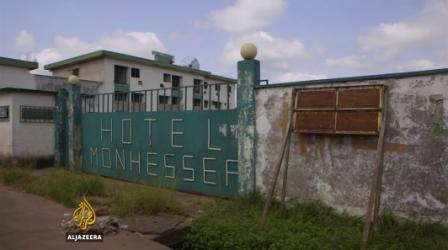“Suppose my neighbour’s house catches fire and I have a length of garden hose…. I may help him put out that fire”: FDR explaining US help for Britain in 1940
High Commissioner Ian Hughes blogs about the conflict in Cote d’Ivoire, the ensuing humanitarian crisis and implications for the sub-region. HC Ian Hughes asks whether more should have been done to stop the fighting. This is an important question to get right. This year alone there will be more than a dozen elections in Africa, including one in Liberia. Next year another batch, including Sierra Leone, will follow. If incumbent Presidents can choose whether or not to accept the will of the electorate there is a real risk that one or more countries may follow Cote d’Ivoire into conflict”.
I’m writing today from Bahn in Liberia. I’m with Stephen O’Brien, Britain’s Minister for International Development. We are witnessing the plight of thousands of refugees fleeing the fighting in Cote d’Ivoire. As a result, I’m thinking about how a once peaceful and vibrant country skidded into conflict even after its people had spoken at the ballot box. And I’m wondering what their experience means for our sub-region.
Here in Bahn, international humanitarian assistance is supplementing the heart-warming and generous support provided by ordinary – often poor – Liberians who have not stinted when asked for help. We have seen families registered, food distributed, water and health systems established. Dozens of organisations and hundreds of workers from the UN, government and civil society are involved.
I have been asked if it is enough to offer food, shelter and first aid – should more have been done to stop the fighting?
This is an important question to get right. This year there will be more than a dozen elections in Africa, including one in Liberia. Next year another batch, including Sierra Leone, will follow. If incumbent Presidents can choose whether or not to accept the will of the electorate there is a real risk that one or more countries may follow Cote d’Ivoire into conflict.
I believe that prevention is better than cure: it is better to help countries steer clear of conflict than to stop fighting once it has started. I am convinced that ensuring government works for everybody, not just governing party supporters, is vital for this; that democracy must not just be about elections but about dialogue between government and citizens; that when dialogue works, societies live together peacefully; and that when it does not, conflict looms.
I also believe that when conflict threatens innocent civilians in a country, neighbours should encourage restraint and peaceful solutions. When mediation fails they should take the lead in deciding what action to take, consulting regional organisations and the UN. And all should support collective decisions taken.
Exactly this has happened for Cote d‘Ivoire. President Koroma was part of an ECOWAS mediation effort trying to bring the two sides together. The African Union and UN added their weight too. But President Gbagbo refused to accept he had lost the election, clung to power and watched his country catch fire as a result.
And we have to remember that although the fighting seems over, Cote d’Ivoire will still need international help. Yet we need to be realistic: national reconciliation cannot come from outside. Only if Ivorians work together can they deliver positive change and a successful transition that is acceptable to all. There’s a long way to go yet!
What do you think about all this?
Ian Hughes, British High Commissioner, Freetown
Stay with Sierra Express Media, for your trusted place in news!
© 2011, https:. All rights reserved.






